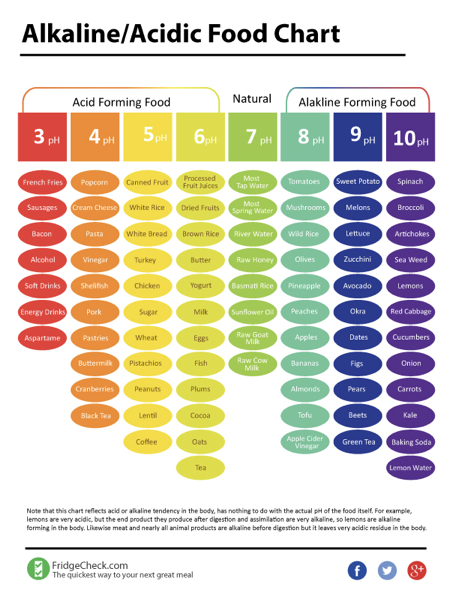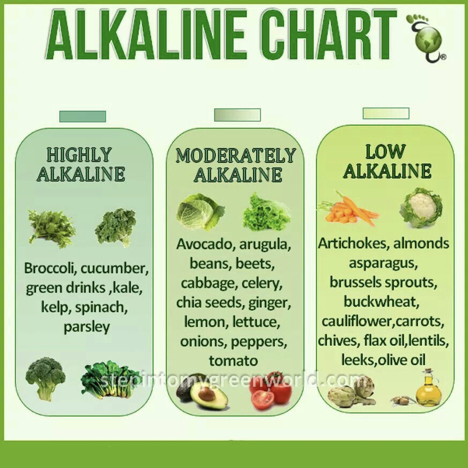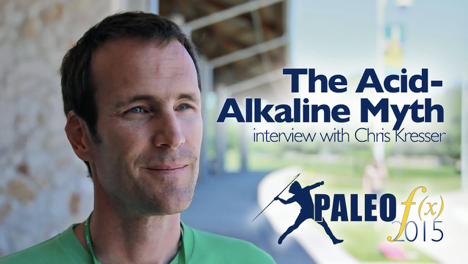Alkaline Foods: The Great Health-Protectors
You’ve probably heard of acid and alkaline foods. In a nutshell, food scientists have found that we need to eat more alkaline foods and less acidic foods. Why? Because alkaline foods:

PROMOTE WEIGHT LOSS. This is simply because they contain fewer calories than most acidic foods (such as red meat).
REDUCE THE RISK OF HEART DISEASE. Acidic foods wreck havoc with the heart. Eating more alkaline foods protects all things heart-related.
PREVENT CANCER. Abundant evidence shows that alkaline foods reduce cancer risk and even offset the debilitating effects of chemotherapy.
IMPROVE GROWTH HORMONE LEVELS. When these levels improve, so does the memory and cognition ability.
MITIGATE BACK PAIN. New research shows that eating alkaline foods help with back issues—healing and recovery, specifically.
PROMOTE HEALTHY MUSCLES AND BONES. Scientists have found that alkaline foods improve muscle integrity, especially as we start to get older. With stronger muscles there are less falls and bone fractures. Their studies also show that alkaline foods help prevent osteoporosis, especially in women.
So what are these great health-protectors—what are alkaline foods, exactly? There are no surprises here:

GREEN LEAFY VEGETABLES. These are a good source of alkaline, as well as several other nutrients and minerals that your body can’t function properly without.
ROOT VEGETABLES. Vegetables such as sweet potatoes, beets, carrots, and lotus roots are loaded with alkali. And they taste wonderful when roasted and sprinkled with seasonings, placed in a salad or soup, or into a sizzling stir-fry. The caution is to avoid over-cooking them, not just for the sake of taste, but for protecting their nutrient count.
CITRUS FRUITS. It seems counter-intuitive to call highly acidic fruit alkaline. But they’re actually among the best. Once injested, they turn alkaline.
SEASONAL FRUIT. Some of the best alkaline seasonal fruits are ones you may already be eating. A few of them include apples, watermelon, kiwi, nectarine, pineapple, apricots, and grapefruit.
FRESH GARLIC, ONION, GINGER. These flavor-enhancing ingredients are absolutely necessary when you’re cooking most ethnic dishes, and are alkaline power-houses.
NUTS. Almonds, cashews, pecans, and walnuts are a good source of both fat (the good kind) and alkaline. Peanuts and pistachios, however, contain high levels of acidity, so don’t eat too many of them.
SEA SALT, SEAWEED. Sea vegetables (kelp, nori, dulse) are crammed with nutrients nearly ten times the amount of those that are grown on land? Both sea salt and seaweed are said to be highly alkaline, and they have several other health benefits as well.
With alkaline foods identified, let’s now pinpoint acidic foods. This is painful because most of us love just about everything on this list:

SUGAR and anything containing refined sugar. No surprise, right?
PROCESSED FOOD
FRESH AND PROCESSED MEATS
FISH
GRAINS
MOST DAIRY PRODUCTS
SODA POP
HIGH PROTEIN FOODS
SOME SUPPLEMENTS
But all this said, we know that many acidic foods have value and health benefits (whole grain breads, eggs, unsweetened yogurt, wild salmon, etc). We just need to eat smaller amounts. And when it comes to the other stuff (sugar and processed foods), we need to indulge just once in a while.
Finally, there is lots of controversy around the acid/alkaline foods theory. You’ll find science for it, you’ll find science that disputes it. This dietary approach has even been called a “nutrition myth.”

But I’ve found personally that I have better health, I look better, and I have more energy when my diet consists mostly of nutrient-dense, whole, plant-based foods. So I leave it to you to decide, but it seems overall, that the best practice is to make sure our meal plates are consistently filled with mostly alkaline foods, as opposed to sugary, processed, and nutrient-deficient foods.

PROMOTE WEIGHT LOSS. This is simply because they contain fewer calories than most acidic foods (such as red meat).
REDUCE THE RISK OF HEART DISEASE. Acidic foods wreck havoc with the heart. Eating more alkaline foods protects all things heart-related.
PREVENT CANCER. Abundant evidence shows that alkaline foods reduce cancer risk and even offset the debilitating effects of chemotherapy.
IMPROVE GROWTH HORMONE LEVELS. When these levels improve, so does the memory and cognition ability.
MITIGATE BACK PAIN. New research shows that eating alkaline foods help with back issues—healing and recovery, specifically.
PROMOTE HEALTHY MUSCLES AND BONES. Scientists have found that alkaline foods improve muscle integrity, especially as we start to get older. With stronger muscles there are less falls and bone fractures. Their studies also show that alkaline foods help prevent osteoporosis, especially in women.
So what are these great health-protectors—what are alkaline foods, exactly? There are no surprises here:

GREEN LEAFY VEGETABLES. These are a good source of alkaline, as well as several other nutrients and minerals that your body can’t function properly without.
ROOT VEGETABLES. Vegetables such as sweet potatoes, beets, carrots, and lotus roots are loaded with alkali. And they taste wonderful when roasted and sprinkled with seasonings, placed in a salad or soup, or into a sizzling stir-fry. The caution is to avoid over-cooking them, not just for the sake of taste, but for protecting their nutrient count.
CITRUS FRUITS. It seems counter-intuitive to call highly acidic fruit alkaline. But they’re actually among the best. Once injested, they turn alkaline.
SEASONAL FRUIT. Some of the best alkaline seasonal fruits are ones you may already be eating. A few of them include apples, watermelon, kiwi, nectarine, pineapple, apricots, and grapefruit.
FRESH GARLIC, ONION, GINGER. These flavor-enhancing ingredients are absolutely necessary when you’re cooking most ethnic dishes, and are alkaline power-houses.
NUTS. Almonds, cashews, pecans, and walnuts are a good source of both fat (the good kind) and alkaline. Peanuts and pistachios, however, contain high levels of acidity, so don’t eat too many of them.
SEA SALT, SEAWEED. Sea vegetables (kelp, nori, dulse) are crammed with nutrients nearly ten times the amount of those that are grown on land? Both sea salt and seaweed are said to be highly alkaline, and they have several other health benefits as well.
With alkaline foods identified, let’s now pinpoint acidic foods. This is painful because most of us love just about everything on this list:

SUGAR and anything containing refined sugar. No surprise, right?
PROCESSED FOOD
FRESH AND PROCESSED MEATS
FISH
GRAINS
MOST DAIRY PRODUCTS
SODA POP
HIGH PROTEIN FOODS
SOME SUPPLEMENTS
But all this said, we know that many acidic foods have value and health benefits (whole grain breads, eggs, unsweetened yogurt, wild salmon, etc). We just need to eat smaller amounts. And when it comes to the other stuff (sugar and processed foods), we need to indulge just once in a while.
Finally, there is lots of controversy around the acid/alkaline foods theory. You’ll find science for it, you’ll find science that disputes it. This dietary approach has even been called a “nutrition myth.”

But I’ve found personally that I have better health, I look better, and I have more energy when my diet consists mostly of nutrient-dense, whole, plant-based foods. So I leave it to you to decide, but it seems overall, that the best practice is to make sure our meal plates are consistently filled with mostly alkaline foods, as opposed to sugary, processed, and nutrient-deficient foods.
Sources:
www.fridgecheck.com
www.stepintomygreenworld.com
www.ascenddentalcare.com
www.youtube.com
 Alice Osborne
Alice Osborne
Weekly Newsletter Contributor since 2006
Email the author! alice@dvo.com
